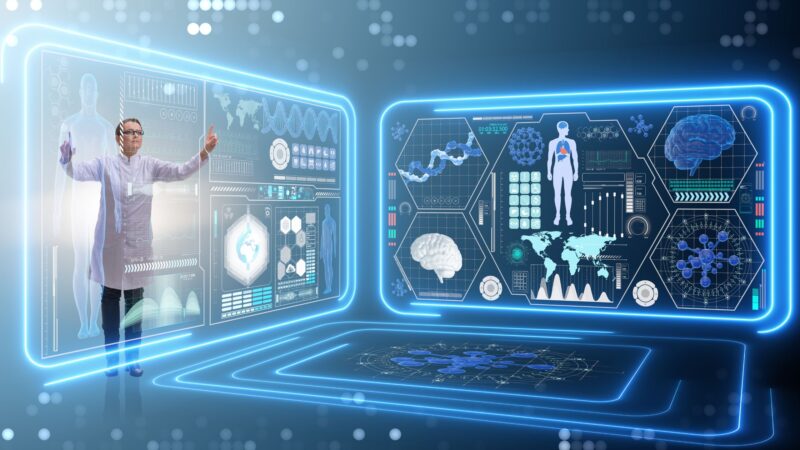Introduction to AI in Healthcare
The world of healthcare is undergoing a transformative shift, driven by the rapid advancements in artificial intelligence (AI). In this dynamic landscape, predictive analytics emerges as a game changer. Imagine being able to foresee potential health issues before they become critical. This isn’t science fiction—it’s happening right now.
With AI’s ability to analyze vast amounts of data quickly and accurately, we are stepping into a new era of medical diagnostics that enhances patient care and streamlines operations. As technology continues to evolve, it opens doors for innovative solutions that can revolutionize how healthcare professionals approach diagnosis and treatment.
Join us as we explore the profound impact of predictive analytics on healthcare, uncover its benefits, examine real-world success stories, and confront the ethical challenges that arise in this brave new world. The future is bright with possibilities fueled by AI; let’s dive deeper into what lies ahead!
Benefits and Advantages of Using AI in Healthcare
AI brings numerous benefits to the healthcare sector. One of its most significant advantages is enhanced accuracy in medical diagnostics. By analyzing vast amounts of data, AI can identify patterns that human eyes might miss.
Efficiency is another key benefit. With AI handling mundane tasks, healthcare professionals can focus on patient care rather than paperwork. This leads to faster response times and improved overall service quality.
Predictive analytics also plays a crucial role in preventive medicine. It allows for early identification of potential health issues, enabling timely interventions that can save lives.
Furthermore, AI fosters personalized treatment plans tailored to individual patients’ needs. Such customization increases the chances of successful outcomes and enhances patient satisfaction.
Cost reduction is yet another advantage worth mentioning. By streamlining operations and reducing diagnostic errors, AI helps lower overall healthcare expenses while maintaining high standards of care.
Predictive Analytics and its Role in Healthcare
Predictive analytics is transforming the healthcare landscape. By leveraging vast amounts of data, it identifies patterns that can forecast patient outcomes and disease progression.
These insights empower medical professionals to make informed decisions. For example, hospitals can anticipate patient admission rates, allowing for better resource allocation. This not only improves care but also minimizes costs.
Another significant application lies in early diagnosis. Algorithms analyze historical health records and genetic information to predict potential illnesses before they manifest. This proactive approach enhances treatment effectiveness.
Moreover, predictive models support personalized medicine by tailoring interventions specific to individual needs. Patients receive targeted therapies based on predicted responses rather than a one-size-fits-all solution.
The integration of predictive analytics into clinical workflows signifies a leap towards smarter healthcare systems where data-driven decisions lead to improved patient experiences and outcomes.

Real-Life Examples of Successful Implementation of Predictive AI in Healthcare
One notable example of predictive AI in healthcare is the use of algorithms at Mount Sinai Health System in New York. They implemented machine learning models to predict acute kidney injury, allowing doctors to intervene earlier and potentially save lives.
Another successful application can be seen at the University of California, San Francisco (UCSF). Their team developed a system that predicts patient deterioration by analyzing real-time data from electronic health records. This proactive approach has significantly improved patient outcomes.
In another instance, flatiron Health utilized AI to analyze cancer treatment data. By predicting how patients will respond to specific therapies, they’ve enabled oncologists to tailor treatments more effectively.
These examples illustrate just a fraction of what predictive analytics can do within medical diagnostics and healthcare systems worldwide. The combination of vast amounts of data with intelligent algorithms holds immense potential for future advancements.
Ethical Concerns and Challenges of Using AI in Healthcare
The integration of AI in healthcare raises significant ethical concerns. One major issue is patient privacy. With sensitive medical data being processed, there’s a risk of unauthorized access and misuse.
Bias in AI algorithms presents another challenge. If the training data lacks diversity, it may lead to skewed outcomes that affect certain demographics unfairly. This can create disparities in medical diagnostics.
Informed consent becomes complicated when patients are treated by AI systems. Many individuals might not fully understand how their data is used or the decision-making processes behind automated diagnoses.
Additionally, accountability poses questions for providers and developers alike. When an error occurs due to AI recommendations, who bears responsibility? These complexities must be addressed as technology continues to evolve within the healthcare landscape.
Future Possibilities and Developments in the Field of AI in Healthcare
The future of AI in healthcare is brimming with potential. Imagine algorithms that can learn from vast datasets, predicting diseases before symptoms manifest. This shift could revolutionize preventative care.
Wearable technology will intersect with predictive analytics to offer real-time health monitoring. Devices may alert patients and doctors about emerging health risks instantly, prompting timely interventions.
Moreover, advancements in natural language processing will enhance patient interactions. Virtual assistants could provide tailored medical advice based on individual histories and preferences, making healthcare more accessible.
Integrating AI into telemedicine platforms promises dynamic diagnostics as well. As remote consultations become the norm, predictive tools can analyze patient data during visits to facilitate better decision-making.
Research continues to explore ethical frameworks for responsible usage of these technologies. As regulations evolve alongside innovations, a balance between efficiency and patient privacy must be maintained while navigating this transformative landscape.
Conclusion
The integration of AI in healthcare, particularly through predictive analytics, is reshaping the landscape of medical diagnostics. By harnessing vast amounts of data, healthcare providers can identify patterns that lead to earlier diagnoses and more personalized treatment plans. This not only enhances patient outcomes but also optimizes resource allocation within health systems.
However, the journey toward fully embracing AI comes with its own set of challenges. Ethical considerations around data privacy and algorithmic bias must be addressed to ensure equitable access to these innovations. As technology advances, it will be crucial for stakeholders across the industry to collaborate on creating frameworks that prioritize patient welfare while driving innovation.
Looking ahead, the potential for further developments in predictive analytics within healthcare remains immense. With continuous advancements in machine learning and big data processing capabilities, we could see even more sophisticated models predicting health trends before they become critical issues.
As this field evolves, staying informed about both its possibilities and limitations will help navigate the future landscape of healthcare effectively. The promise held by AI offers a glimpse into a healthier tomorrow where proactive care becomes the standard rather than reactive measures following illness or disease progression.








